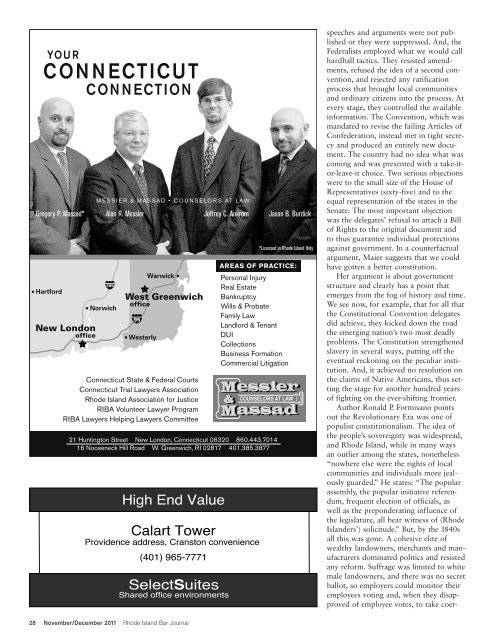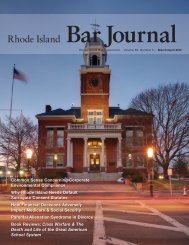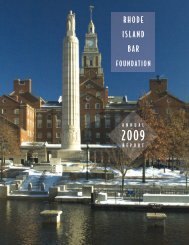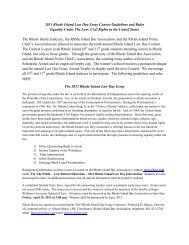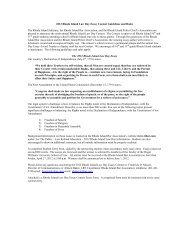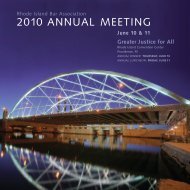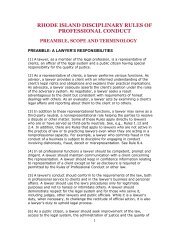Are We Taking The Sex Offender Label Too Far? - Rhode Island Bar ...
Are We Taking The Sex Offender Label Too Far? - Rhode Island Bar ...
Are We Taking The Sex Offender Label Too Far? - Rhode Island Bar ...
You also want an ePaper? Increase the reach of your titles
YUMPU automatically turns print PDFs into web optimized ePapers that Google loves.
YOUR<br />
CONNECTICUT<br />
CONNECTION<br />
• Hartford<br />
New London<br />
office<br />
M ESSIER & MASSAD • COUNSELORS ATLAW<br />
Gregory P. Massad* Alan R. Messier Jeffrey C. Ankrom<br />
• Norwich<br />
• <strong>We</strong>sterly<br />
Warwick •<br />
<strong>We</strong>st Greenwich<br />
office<br />
Connecticut State & Federal Courts<br />
Connecticut Trial Lawyers Association<br />
<strong>Rhode</strong> <strong>Island</strong> Association for Justice<br />
RIBA Volunteer Lawyer Program<br />
RIBA Lawyers Helping Lawyers Committee<br />
AREAS OF PRACTICE:<br />
Personal Injury<br />
Real Estate<br />
Bankruptcy<br />
Wills & Probate<br />
Family Law<br />
Landlord & Tenant<br />
DUI<br />
Collections<br />
Business Formation<br />
Commercial Litigation<br />
21 Huntington Street New London, Connecticut 06320 860.443.7014<br />
16 Nooseneck Hill Road W. Greenwich, RI 02817 401.385.3877<br />
High End Value<br />
Calart Tower<br />
Providence address, Cranston convenience<br />
(401) 965-7771<br />
SelectSuites<br />
Shared office environments<br />
Jason B. Burdick<br />
*Licensed in <strong>Rhode</strong> <strong>Island</strong> Only<br />
speeches and arguments were not published<br />
or they were suppressed. And, the<br />
Federalists employed what we would call<br />
hardball tactics. <strong>The</strong>y resisted amendments,<br />
refused the idea of a second convention,<br />
and rejected any ratification<br />
process that brought local communities<br />
and ordinary citizens into the process. At<br />
every stage, they controlled the available<br />
information. <strong>The</strong> Convention, which was<br />
mandated to revise the failing Articles of<br />
Confederation, instead met in tight secrecy<br />
and produced an entirely new document.<br />
<strong>The</strong> country had no idea what was<br />
coming and was presented with a take-itor-leave-it<br />
choice. Two serious objections<br />
were to the small size of the House of<br />
Representatives (sixty-five) and to the<br />
equal representation of the states in the<br />
Senate. <strong>The</strong> most important objection<br />
was the delegates’ refusal to attach a Bill<br />
of Rights to the original document and<br />
to thus guarantee individual protections<br />
against government. In a counterfactual<br />
argument, Maier suggests that we could<br />
have gotten a better constitution.<br />
Her argument is about government<br />
structure and clearly has a point that<br />
emerges from the fog of history and time.<br />
<strong>We</strong> see now, for example, that for all that<br />
the Constitutional Convention delegates<br />
did achieve, they kicked down the road<br />
the emerging nation’s two most deadly<br />
problems. <strong>The</strong> Constitution strengthened<br />
slavery in several ways, putting off the<br />
eventual reckoning on the peculiar institution.<br />
And, it achieved no resolution on<br />
the claims of Native Americans, thus setting<br />
the stage for another hundred years<br />
of fighting on the ever-shifting frontier.<br />
Author Ronald P. Formisano points<br />
out the Revolutionary Era was one of<br />
populist constitutionalism. <strong>The</strong> idea of<br />
the people’s sovereignty was widespread,<br />
and <strong>Rhode</strong> <strong>Island</strong>, while in many ways<br />
an outlier among the states, nonetheless<br />
“nowhere else were the rights of local<br />
communities and individuals more jealously<br />
guarded.” He states: “<strong>The</strong> popular<br />
assembly, the popular initiative referendum,<br />
frequent election of officials, as<br />
well as the preponderating influence of<br />
the legislature, all bear witness of (<strong>Rhode</strong><br />
<strong>Island</strong>ers’) solicitude.” But, by the 1840s<br />
all this was gone. A cohesive elite of<br />
wealthy landowners, merchants and manufacturers<br />
dominated politics and resisted<br />
any reform. Suffrage was limited to white<br />
male landowners, and there was no secret<br />
ballot, so employers could monitor their<br />
employees voting and, when they disapproved<br />
of employee votes, to take coer-<br />
28 November/December 2011 <strong>Rhode</strong> <strong>Island</strong> <strong>Bar</strong> Journal


